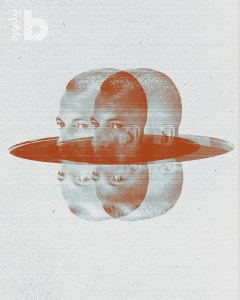
Marwan Moussa
Amina Zaher/Billboard Arabia
In a studio hangar just outside Cairo, weeks before the release of his new album The Man Who Lost His Heart, Marwan Moussa sits with a resolve that only grief teaches. The kind shaped by someone who’s been to the depths of loss and carried back not just a song, but 23. The album wasn’t built overnight, Marwan Moussa explains to Billboard Arabia in his exclusive May cover interview. It was carved out of grief and shaped with intention. Each track, he says, was sculpted from the turbulent, shifting emotions he experienced during the long and winding journey of healing after the heartbreak of losing his mother two years ago.
The album, he says, was “a kind of therapy.” Like writing a journal, sleeping on it, then reading it with fresh eyes to look at his life from a different perspective.
The Man Who Lost His Heart doesn’t open with a bang; it opens like a dream taking shape. “Try to remember” is the first line we hear, fighting its way through an ethereal sound design. Structured in five parts, the album mirrors the five stages of grief – denial, anger, bargaining, depression and acceptance – but more than that, it charts the long, slow work of survival. Moussa doesn’t just document his pain; he invites you into it, offering a guide and companionship with each track.
“It isn’t a linear journey, of course,” he explains. “You could be angry, then suddenly find yourself depressed, and then all the way back in the denial stage.”
But the album isn’t merely a chronicle of grief. It’s a sonic deconstruction of Moussa’s process. Blending trap-shaabi (a genre he helped popularize that combines trap beats with various textures found within Egypt’s popular folk music), heavy synths, tender melodies and deeply personal sound bites – including audio lifted from childhood VHS tapes of him and his family – he crafts a layered, emotional landscape.
The Man Who Lost His Heart isn’t just a collection of songs. It’s a reckoning.
Take his track “BOSAKBER,” which spirals through memory and misfire. His flow isn’t clean; it’s distorted and fractured like a freshly broken heart. In the accompanying video, directed by Youssef Haridy, Moussa appears alone beneath a wide, empty sky. He fights his own reflection. The imagery is both surreal and stark, but not hopeless. It’s not the portrait of someone broken – it’s the portrait of an artist in the whirlwind of putting themselves back together, even if the pieces no longer fit the way they once did.
“We wanted to create a surreal imagery that feels deeply rooted in oriental aesthetics; something distinct,” Moussa says.
Moussa is not new to transformation. Over the last several years, he’s become one of the most influential voices in Arabic hip-hop – not only as a rapper, but as the producer behind dozens of hits, including “Brazil,” and more recently “Kebda” for longtime collaborator Afroto. He’s also been a constant on Billboard Arabia’s Artist 100 chart for over 55 consecutive weeks.
Moussa first set foot on Egypt’s hip-hop scene in 2016, releasing his early tracks on SoundCloud. The following year, his collaborations with Abyusif on “La2 Mafeesh” (No, There Isn’t) and “Zaghzaghto” (Tickling) brought him into the spotlight, and his skills as both rapper and producer began to further solidify.
In 2018, he released his first music video for “Kiki,” which marked his production breakthrough. Then came “Fr3on” (Pharaoh) in 2019, with its unpredictable rhymes and sharp wordplay over a solid beat and advanced production techniques.

Marwan Moussa
Amina Zaher/Billboard Arabia

Marwan Moussa
Amina Zaher/Billboard Arabia
After experimenting with several genres, Moussa’s 2019 track “El Bosla Da3et” (The Compass Is Lost) marked a turning point not only for his career, but for Egyptian trap as a whole. It was one of the first tracks to experiment with fusing shaabi and trap, paving the way for the rise of trap-shaabi, as it became known subsequently.
His 2021 album Florida cemented his reputation as an innovator, blending regional rhythms with experimental production in a way few dared to. From songs like “Tesla” and “Sheraton” to shaping his own catalog to producing for Egypt and North Africa’s most respected MCs, Moussa has always known how to bend sound to feeling.
But The Man Who Lost His Heart, released in full on May 5, is different. If Florida was Moussa pushing his craft’s limits, this album is what remains when all else falls away – just music, message and the strength found in the breaking.
That strength is amplified by a slate of carefully chosen collaborators. The album features standout moments with producer El Waili on “Yamma” and Afroto, as well as verses from Lege-Cy on “Klameny Belel.” But it’s Donia Wael’s contribution that Moussa calls essential to the record’s emotional core. “I want Donia Wael’s voice on the album to be interpreted by each listener in his or her own way—as a girlfriend, friend or therapist,” he says.
“The reason the album came out this way,” says Moussa, “is that I thought if I give through the five stages of grief, maybe it helps you get through what you’re dealing with or get past a tough time in your life or your current period of depression.”
In that way, The Man Who Lost His Heart is more than an act of expression. It’s an offering. A hand on your shoulder there to remind you that no stage of sadness lasts forever, even when it feels like it might.
For Moussa, producing an album this emotional, meant risking everything: the cool detachment of a hardened rapper. What he’s delivered instead is something harder, and far more lasting. A document of heartbreak. And perhaps, in doing so, he has found his heart again, and his voice.

Marwan Moussa
Amina Zaher/Billboard Arabia